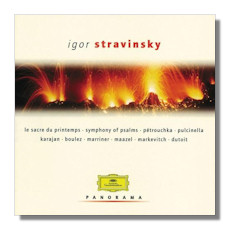
The Internet's Premier Classical Music Source
Related Links
- Stravinsky Reviews
- Latest Reviews
- More Reviews
-
By Composer
-
Collections
DVD & Blu-ray
Books
Concert Reviews
Articles/Interviews
Software
Audio
Search Amazon
Recommended Links
Site News
 CD Review
CD Review
Igor Stravinsky

- The Firebird (suite) 1
- The Rite of Spring 2
- Symphony of Psalms 3
- Pulcinella Suite 4
- Concerto in E Flat Major "Dumbarton Oaks" 5
- Pétrouchka 6
- Circus Polka 2
1 Berlin Radio Symphony Orchestra/Lorin Maazel
2 Berlin Philharmonic Orchestra/Herbert von Karajan
3 Russian State Academy Choir & Orchestra/Igor Markevitch
4 Academy of St. Martin-in-the-Fields/Neville Marriner
5 Ensemble Intercontemporain/Pierre Boulez
6 London Symphony Orchestra/Charles Dutoit
Deutsche Grammophon Panorama 469205-2 2CDs
All of these performances are new to the archives of Classical Net, although they are time-honored ones that will be familiar to many collectors. The "Panorama" series was aimed at beginners, but the selections were surprisingly ambitious given that aim, and all but one performance – Maazel's blistering Firebird – were new to my personal collection. Except for one poor choice, this reasonably priced two-disc set should satisfy the composer's many fans.
As I mentioned, disc one starts off with Maazel's very exciting suite from The Firebird. The Berlin Radio forces give everything they have, and if they are lacking in warmth and beauty, Maazel's legendary podium technique ensures that the score's many details and colors are skillfully extracted. The famous Infernal Dance is certainly that, although some may find the brass almost too vulgar. At this stage in his career (read: very early) the conductor was more willing to allow this kind of unbridled excitement, and it is stark contrast to his later, stiffer readings. I like it very much. Sadly, the one poor choice comes next. This Rite of Spring is one of the worst ever recorded. It isn't the one that Stravinsky himself hated, but it's arguably less successful than that. I've read several critics who like Karajan's way with the work, but it honestly sounds nothing like any other Rite, and in the worst possible way. Brass and percussion are hopelessly muted, while the famed Berlin strings are way out of their element here. A mess. The program's first half concludes with an eye-opening Symphony of Psalms. The quality of playing is very poor in places, but the sheer excitement and fervor is unquestionable. The all-Russian forces sound authentic and engaged. Markevitch was a master conductor, and his inclusion here is a wonderful choice. Thanks to Universal for allowing this unpolished, but very meaningful performance to reappear here.
The second disc is almost entirely successful and includes a couple readings that can be hard to find. Sir Neville Marriner didn't make his name in 20th-century music, but he could conduct it all the same; his Stravinsky is excellent. The Academy successfully navigates Pulcinella, and while not the finest performance in existence, it's always good to see these forces in unfamiliar fare. Dutoit is another conductor you wouldn't expect in Stravinsky, but his Pétrouchka is even finer. He's recorded it twice, but this is his earlier, better, version in a rare (and again very early) guest appearance with the London Symphony Orchestra. Dutoit gets this orchestra to play with an unusually colorful palette, and also proves himself attuned to matters of balance and sectional voices. For collectors who see him as an increasingly dull interpreter, this is a great reminder of his first efforts, and his very real talents. In between the two "big" pieces is a staggeringly good Dumbarton Oaks. Boulez brings his customary clarity and rhythmic exactitude to the proceedings. Again, it's not a work I would expect in a beginners' set; it really enhances the appeal of the package, and along with the Markevitch, demonstrates a willingness to think outside the box. The set ends with Karajan's Circus Polka, which ironically has all the qualities missing from his Rite of Spring. All in all, a very rewarding purchase.
Copyright © 2014, Brian Wigman



















